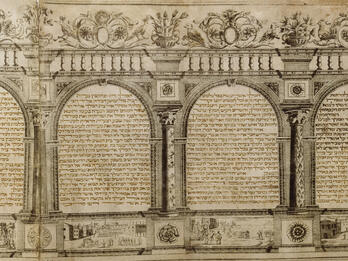Ḥemdat yamim (Choicest of Days): On Rosh Ḥodesh
Chapter 1 [On the Customs of Rosh Ḥodesh Eve]
[ . . . ] Based on the above reasoning, you can see how wrong those people are who fast on the day of the birth of the new moon, as the whole reason for the fast is because the moon is diminished, but as the birth of the new moon has already occurred, it is no longer diminished at all. My teacher (of blessed memory) testified in the name of our teacher, R. Saruk1 (of blessed memory) that he would fast on the day of the molad [i.e., the conjunction of the sun and moon, when the moon is invisible] itself, until the time of its birth [i.e., when the new moon becomes visible], at which point he would eat, even if the birth occurred in the middle of the day. In the Shaḥarit service on Rosh Ḥodesh Eve, he would not recite the supplicatory prayers if the molad occurred before the time of the prayer. He acted in the same manner with regard to haircuts, shaving, and cutting fingernails, and he has his reason and justification for this practice, as stated.
From here you can appreciate the mistake of those who fast for the month of Iyar in the month of Adar. They do so because one may not fast during the month of Nisan, but they err in two matters. First, the ruling authorities have written regarding the disciples who have the custom to fast on Mondays and Thursdays throughout the year, on account of the desecration of the Divine Name etc., that they must fast even during the month of Nisan, as those fasts should not be annulled just because the princes brought their offerings and treated each of their days as a festival [see Numbers 7]. All the more so, and a fortiori, that after Passover they should observe the fast of Rosh Ḥodesh Eve that they accepted upon themselves for the entire year. Second, since the reason for the fast is the incomplete state of the moon, how can they fast over its future incomplete state? It is an ignorant custom.
According to this reasoning, when Rosh Ḥodesh falls on a Sunday we do not say that since the fast has been moved it should be moved back to Thursday. Rather, it is preferable to observe it as near as possible to Rosh Ḥodesh, and thus we should fast on Friday. All the more so, when Rosh Ḥodesh falls on a Sabbath we should fast on the Friday, as that is its proper day, and this is obvious.
However, there is another reason for this fast on Rosh Ḥodesh Eve, and it is the main reason that applies in these later generations of ours. It is that Rosh Ḥodesh is a minor Yom Kippur. For this day incorporates the entire month and it is a time of atonement for all, as is stated in the Musaf prayer of Rosh Ḥodesh: “You gave Your people New Moons, it is a time of atonement etc.” One should understand this and fast on this very day; every person should examine the deeds he has performed and executed throughout the month, and remove them with a graving tool (be-ḥarat, Exodus 32:4), with confession and full regret [ḥaratah]. It is impossible to subdue one’s uncircumcised heart to return to the Rock who made it other than by fasting. For if one is eating and drinking and occupying himself with his business, his heart will grow haughty, and he will be unwilling to search his ways and investigate his unworthy actions. He will consider himself a righteous, upright individual, and he will cite forty-nine proofs for the ritual purity of the swarming creature he is holding in his hand.2 By contrast, when he afflicts himself and weakens his senses, the husk of the screen that separates him from his God will likewise be weakened; and the living should take it to heart (Ecclesiastes 7:2). Therefore, the wise will understand this, and on each and every Rosh Ḥodesh Eve [see Isaiah 66:23] they will return to God with all their hearts and throw from their hands the swarming creature that swarmed in the proud waters [see Psalms 124:5] of various kinds. They should request Divine assistance, that He should create for them a new heart and a new spirit.
One of the practices of those who draw near to the Lord is for each individual to seclude himself in a designated room on the day of this fast, freeing himself on this day from all labor and any physical activity, so that his heart is free on that day from all work, in order that he can examine his deeds. It should be for him like a Sabbath, in the manner of the verse: shall you pursue your business on the day of your fast? (Isaiah 58:3). This teaches that on a fast day it is prohibited to deal with business matters, just like on a Sabbath, regarding which it states: [call the Sabbath a delight . . . ] nor pursuing your business, nor speaking about it (Isaiah 58:13). Accordingly, at that time one should reflect on the nature of his being, that is, the nature of his matter and form, and the nature of their place of origin. For the soul emanates from our Father in heaven, and it is like a stranger in this world. Consequently, it must suffer the conditions of a stranger, as King David (may he rest in peace) said: for I am a stranger with You; a sojourner, like all my ancestors (Psalms 39:13). In other words, the soul that emanates from You is like a stranger in this world, whereas the body I received from my ancestors is a sojourner like all my ancestors in the land of thick darkness (Jeremiah 2:31). Remembering these truths will help bring every Jew under the rein of the fear of his Creator, as in the saying of Akabia (may he rest in peace).3
He will then regret in his heart all of the evil deeds that he performed throughout the month, and the misery of his heart will increase when his iniquity is found, and he is hated [see Psalms 36:3]. His eyes will run down with rivers of water [see Psalms 119:136], and his soul will weep in secret [see Jeremiah 13:17] for the internal enemy has magnified himself [see Lamentations 1:9] and has seduced him with his smooth lips [see Proverbs 7:21] to rebel against the lofty, great, and awesome King; holy is He. Then he will confess in secret, full-heartedly, not like the confessions that people say in the synagogue. He will strike upon his heart when he declares “we have become guilty,” as though his hands are lifted heavenward, but his heart will be between the oven and the stove, for he will meditate on his vanities, as we spoke about at length in the second part of the chapters on penitential prayers. After the confession he should sincerely accept upon himself not to return willingly again to such folly. He should repent properly for each individual sin, despite the fact that a general repudiation is sufficient according to the requirements of the Torah, which are that one must regret his former deeds and accept upon himself not to return again and follow the path of the tortuous serpent, and that his path should be directed toward God. Nevertheless, the sages further demanded from him to balance things out, that is, he should mete out suffering for himself corresponding to the pleasure he derived from the sin, as well as the other details clarified in the second section.
It is for this purpose that a fast is required; it is not necessary for its own sake, but for the advantages it provides. The custom in former times in Israel [see Ruth 4:7] was that when they would decree a fast, they would treat it like a Sabbath, on which all labor is forbidden, and one must focus all day on the wishes of Heaven and the fear of God. It is for this reason that they would fast and afflict themselves, so that they would not be distracted by any physical need, such as eating or drinking and the like, until they were like angels of the Lord of Hosts. Such is an honorable fast and a day that is acceptable to the Lord, and God certainly commanded us to observe a fast of this kind.
Notes
[Likely Israel Sarug (d. 1610)—Trans.]
[The Talmud depicts particularly bright students as those who can adduce many proofs for the supposed ritual purity of swarming creatures, which are explicitly listed as impure by the Torah. See b. Eruvin 13b.—Trans.]
[See m. Avot 3:1.—Trans.]
Credits
Published in: The Posen Library of Jewish Culture and Civilization, vol. 5.






